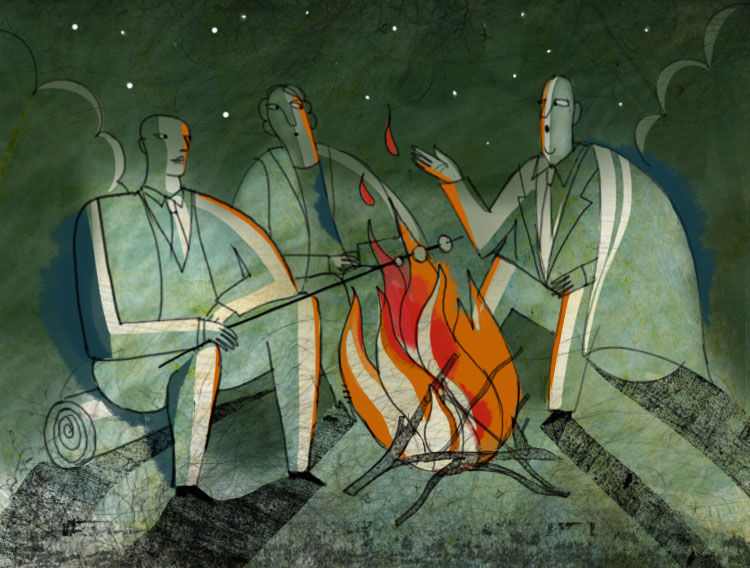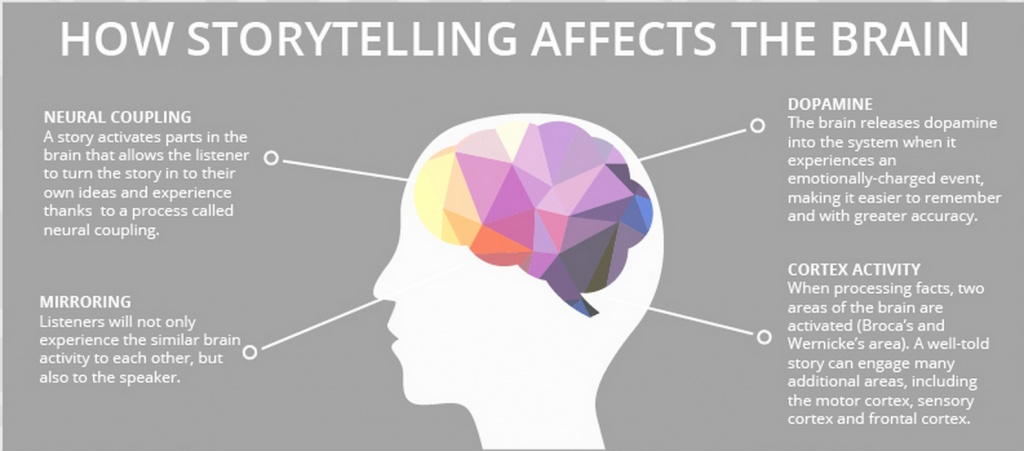UPDATE: This article was originally posted on July 19, 2018. It has been updated with new information and tips below.
With admissions rates at elite MBAs like Stanford Graduate School of Business hovering around 6%, standing out from the crowd is one of the most important challenges you will face during your business school application journey.
Though there are many elements that make up a successful MBA application, one of the most important is your admissions essay.
Writing admissions essays that cut through the noise and help the admissions committee connect with you and your ideas means getting into your target business schools.
And how do you write compelling essays?
It’s simple: tell a good story.
Why does storytelling matter?
In today’s fast-paced world, a sort of “attention economy” has developed in which an ever-increasing stream of inputs battling for our ever-decreasing attention spans.
Wouldn’t it be great if there was a tool that would reliably cut through all the distraction?
Luckily, such a tool already exists. In fact, storytelling has been the key to hacking the brain’s circuitry since long before the first word was ever written down (even Harvard Business School agrees!)
In fact, the importance of storytelling has only become even more entrenched as research on the topic emerges, meaning stories remain one of the most efficient means we have to transmit information to others.
The power of storytelling even extends into a realm often thought to be “too serious” for stories: the business world.

Photo courtesy of Kellogg Insight, Credit: Yevgenia Nayber
Yet, with thought leaders reinforcing that stories are not only important but an essential tool for modern leaders (and the best TED talks being overwhelmingly story-driven), it’s clear that the ability to tell compelling stories is an advantage.
Harnessing this tool when writing your admissions essays goes a long way to giving you the edge you need to land a spot in your dream MBA program.
Hook your reader from the very first sentence
Quickly grabbing your audience’s attention is one of the most important, yet most challenging tasks when telling any story.
Let’s take a look at Nike’s “Breaking 2” commercial, named one of the 10 best ads of 2017.
The ad starts out with the phrase, “Breaking the two hour marathon barrier is impossible.”
Immediately, as we see the runner standing at the starting line, preparing to train in the early light before dawn, we immediately want to know if this solitary figure has what it takes to “do the impossible.”
This curiosity drives us forward and makes it so that we literally can’t take our eyes off of the screen.
A good hook in your essay functions in much the same way: it sparks the reader’s interest and compels them to keep reading.
Let’s take two versions of the same essay for example.
Here, the author has gone right into the story, neglecting to write a hook:
I have always been fascinated by cosmology and astronomy, not only because they relate to the study of the universe, but because they are an exercise in thinking beyond limitations. I first encountered these concepts at a young age. After presenting a perfect report card to my parents at age seven, I was rewarded with a book on spacetime. Diving into the realm of the cosmos inspired me to think about reality in imaginative ways free from the constraints often imposed by society and connecting me to the great thinkers of the past who made groundbreaking discoveries that changed the world.
Did this leave you wanting more? Perhaps not.
However, in the final version of the story, the author hits us with:
What do Copernicus and Phil Knight have in common? I learned about Copernicus after receiving a book on astronomy from my parents that awakened my childhood passion for the cosmos. I first learned about Knight from his book, Shoe Dog, but became more familiar with him much later in life while working with Nike, a client in my portfolio. What both have in common, however, is that they were agents of change. They refused to accept the status quo and revolutionized society with simple yet groundbreaking ideas that changed humanity forever.
This version is much more compelling. Copernicus and Phil Knight seemingly have nothing in common, so figuring this small puzzle out moves the reader forward and ultimately ensures they become immersed in the story.
Though MBA essay word limits are notoriously small, using an interesting hook that is related to your example is a good investment, as it will ensure the admissions committee member perusing your essay keeps reading and, ultimately, calls you for an interview.
Using the STAR Method
STAR stands for Situation – Task – Action – Result.
Once you have determined your “big idea” — or the example you are going to present for the essay, it’s time to employ the STAR method.
The framework will help you write a clear, compelling answer that provides background, tells exactly what you did and ends with a big reveal.
Here’s how it works:
- Situation – Begin with setting the stage and presenting the complication or conflict of the story. For example: “My brand was losing market share to a new competitor”
- Task – Identify your objective in light of the complication and summarize the task or project performed: “I decided to revise our strategy”
- Action – Describe the action steps you took toward your goal: “I surveyed customers to learn what traits they valued and implemented product changes accordingly”
- Results – Summarize the outcome and how you and/or your team made a difference: “We gained 20 additional market share.”
The STAR method makes it very easy for your reader not only to understand what took place, but to also see your role in all of it — important given the fact that it’s you and not your team or company that’s applying for an MBA.
Not convinced you should follow this method? Check out the two stories below. Which does a better job of clearly showing the applicant’s strengths and achievement?
My greatest achievement in life so far has come from my study effort. It was one of the best days of my life when I got the news I was chosen for a scholarship from the Brazilian government to start a project in University of Texas. From this episode I learned that the long run counts a lot because this scholarship didn’t depend on taking a test and having a great day on it. It was awarded to students who had an English proficiency diploma at a specific point in time and a great college record. In Texas, I was forced to become a more independent man and I had the chance to connect with so many people with so many different backgrounds that I can say my desire to explore the world started there.
Or this one?
The achievement I’m most proud of happened recently. At my company, it had been three years since we had raised investments for a new fund, so finding a new opportunity was critical. In mid-December, that great opportunity arose, however, we’d be battling against an unbelievably short deadline to get the project approved.
Normally, at this time of year, we’re still fully staffed, but given the stagnant market, only one manager and myself remained. In addition, the fund’s investment policy relied on a strategy that we’d never used. Finally, I’d never worked on the public offering of a fund before.
Nonetheless, I knew that if the partner and I worked diligently to support each other, we could land this deal. Our first move was to organize a meeting to align all parties involved. Then, we divided tasks, and I took over coordinating stakeholders, assigning tasks and managing deliverables. In the end, we successfully delivered everything on time.
This experience made me more comfortable in a leadership position, as managing diverse stakeholders under pressure helped me better analyze what each brought to the table and execute accordingly. Recently, I’ve even been able to help other teams coordinate new offers. Finally, the project was a great opportunity to learn new management skills from my superior. This reinforced for me how important it will be to learn additional management frameworks at INSEAD and prepare myself to be a leader in the Private Equity market.
Though the first essay includes a tremendous achievement, the lack of structure and details makes it difficult for us to understand exactly what happened.
The second essay clearly tells the story, walking us step by step through her achievement and creating a much more compelling picture of the applicant’s leadership skills in action.
The important role of conflict in stories
In life, we work hard to avoid conflict as much as possible, yet when it comes to stories, conflict is not only important, it is essential to captivating attention.

Would Stranger Things have been as interesting if Eleven hadn’t had to rescue her friends from The Upside Down and they could all have spent a nice summer playing by the lake? Probably not. Watching her master her powers and venture into the unknown (or, in other words, watching how she handles conflict) is just what makes the show so addictive.
Conflict and how our “hero” (in this case, you!) solves the challenge is at the core of any good story, so make sure you use the STAR method to clearly set up the conflict you needed to navigate and then show how you took steps to turn this roadblock into one of your standout moments.
Let’s take this essay for example. In an early version, the story was conflict-free.
Upon joining MBB after graduation, another experience inspired personal growth. While abroad, I participated in recruiting processes for top consulting firms, and saw firsthand that MBB lagged behind in recruiting students pursuing dual degrees abroad. After joining, I created a dedicated process to recruit these top performers. Four months later, we had the first online connection event, which attracted more than 40 interested students. The program has since become an essential recruiting tool. I am proud to lead this internal team in contributing to MBB’s long-term success as we attract the talent we need to deliver high-impact results to clients.
Though this shows initiative on the applicant’s part, it is far less compelling than this version of events:
After graduating, I joined MBB, as it allowed me to channel my intellectual curiosity, explore various sectors and be an agent of change. While abroad, I participated in recruiting processes for other top consulting firms, and saw firsthand that MBB lagged behind in recruiting dual-degree students. After joining, I spoke with several partners about creating a program to solve this issue. The partners were hesitant, however, concerned they could not adequately evaluate candidates remotely. After demonstrating the implications of overlooking these high-potential candidates, I received permission to create a dedicated dual-degree recruiting process. Four months later, I had mobilized 10 colleagues, leading them in organizing BCG’s first online connection event. The program has since become an essential recruiting tool, bringing in more than 10% of our hires since inception.
Here, not only does she show initiative, she also shows she has an ability to clearly communicate and add value to her firm, even when the odds are stacked against her.
So, when writing your MBA application essays, make sure to give your stories some much-needed drama!
Isn’t it better not to use stories so I stand out?
In a word, no.
Our brains are quite literally hard wired to love stories.

SOURCE: OneSpot
Though it is a good idea to choose unique examples to help you stand out, you should not discard the narrative approach when writing.
First, examples that don’t use a story format can often be boring.
We have worked with numerous reapplicants with 770+ GMAT scores who refused to tell stories in their applications and found themselves dinged before interview across the board.
Though the GMAT is certainly a crucial part of any business school application, Harvard estimated that 80% of its 10,000+ applicants were fully qualified to attend the school, meaning that a high GMAT score will only get you so far.
You must also connect with your reader and compellingly show them why you deserve a spot in their prestigious program. To connect psychologically with your reader, your best bet is storytelling.
Second, examples told in non-story formats are often highly confusing.
In general, stories flow nicely from topic to topic, building upon what has already been told to advance the narrative.
When clients neglect to use story format, their essays often end up confusing to read, meaning they fail to clearly demonstrate the candidate’s potential and fit with the school.
For that reason, we suggest choosing unique examples that are both consistent with your personal brand and that show you are a standout among your pool. When writing about the examples, however, stick to the tried-and-true story format.
After all, thousands of years of human history prove this is the right approach!
Get expert help crafting your story
You only get one chance to make an impression on the adcom, so make it count!
Good storytelling in your essays is often the difference between telling a story that moves elite business schools to move you forward in the application process and a “no.”
Yet translating your professional “highlights reel” into compelling stories is no easy task.
That’s why our team at Ellin Lolis Consulting is obsessed with telling your story.
In the words of our recent client Fernando, who secured a full scholarship at Michigan Ross, “If you are looking for an MBA consultant that is capable of understanding your story comprehensively rather than giving quick glances on your essays without understanding your context, go with Ellin.”
Let our award-winning editors use their expert writing abilities, deep understanding of what elite business schools are looking for, and marketing know-how to transform your application essays from average to attention-grabbing and get you a spot in your top choice MBA program!
Real MBA Essays That Got People In
School-specific sample essays that got our clients accepted






